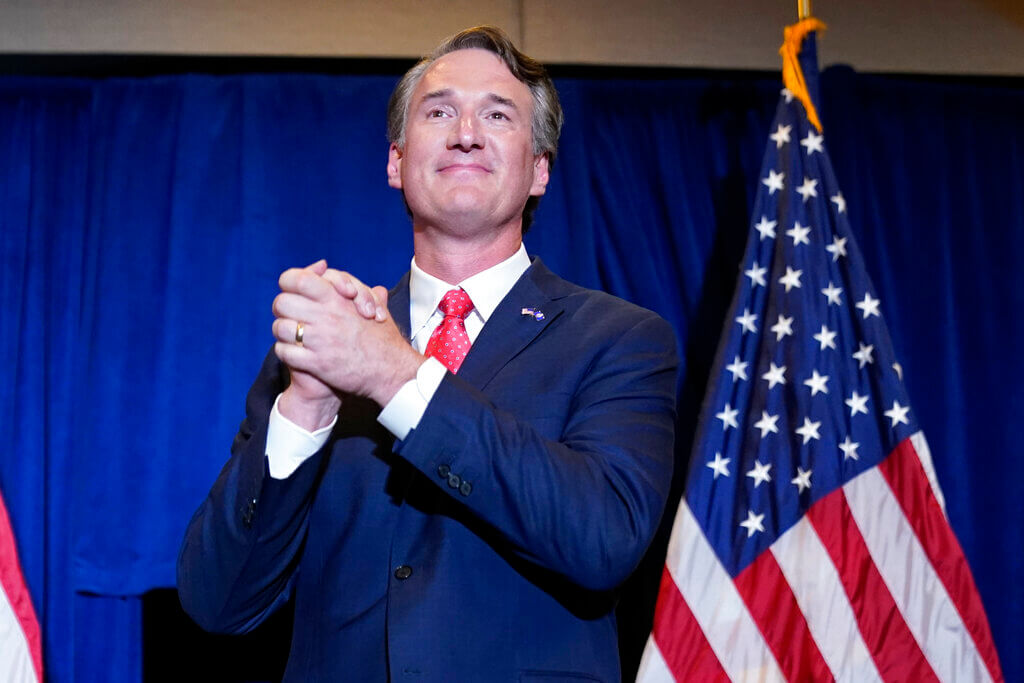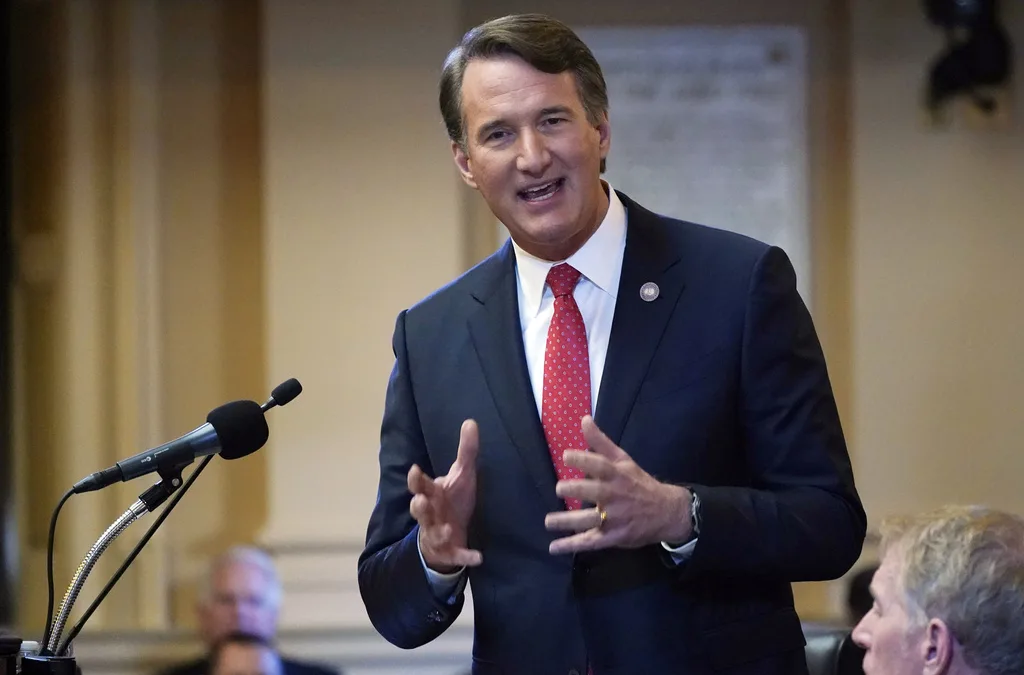
Virginia Gov.-elect Glenn Youngkin arrives to speak at an election night party in Chantilly, Va., early Wednesday, Nov. 3, 2021, after he defeated Democrat Terry McAuliffe. (AP Photo/Andrew Harnik)
The full outcome of Tuesday’s election may take days or weeks to work out, but gridlock seems very likely in the commonwealth.
UPDATE: This article and headline was updated on 11/3 at 11:45 am with additional election results.
Banning historical racism from being taught in schools. Reversing requirements that students wear masks in schools. Diverting public education funding to charter schools.
These are just some of the policies that Virginia’s new leader could implement, after voters on Tuesday elected Republican Glenn Youngkin as governor. Youngkin beat Democratic candidate and former Gov. Terry McAuliffe by two points, 51% to 48%. Youngkin’s victory was a surprise after a decade in which Virginia became increasingly blue. Tuesday’s election showed that there remains a path to power for Republicans in Virginia.
The news was also grim for Democrats in the House of Delegates, where the party held a 55-45 majority before Tuesday’s election. That lead clearly slipped after the election, but several races are still too close to call.
Sigalle Reshef, a spokeswoman for House Speaker Eileen Filler-Corn, said the outcome was still unclear. “There are still more votes to be counted, which is why there’s a process to make sure the numbers are reflected accurately and the voters have their voices heard,” Reshef said.
But the GOP claimed victory, with House Republican Leader Todd Gilbert saying the party “clearly won six seats previously held by Democrats,” giving Republicans the majority. Four of the six seats Gilbert cited had not been called by The Associated Press as of early Wednesday.
At one point on election night it appeared the House of Delegates could be split evenly between Democrats and Republicans. There is no tie-breaker in the House of Delegates, meaning a 50-50 result after all the ballots are counted (and in some races, likely recounted) would force Democrats and Republicans to establish a power-sharing agreement. The chamber had to strike such a deal in 1998.
Regardless of what happens with the House, there is likely to be gridlock between the Youngkin administration and the state legislature, as Democrats hold the state Senate with a slim majority, 21-19.
McAuliffe conceded to Youngkin Wednesday morning. “While there will be setbacks along the way, I am confident that the long term path of Virginia is toward inclusion, openness and tolerance for all,” he said in a statement.
Youngkin, a former private equity CEO and political novice, exploited a turbulent political environment for Democrats and successfully fueled culture war controversies to flip Virginia red.
In the early months of his campaign, Youngkin focused on bread-and-butter issues such as taxes, but as summer turned to fall, he pivoted to the issue of education, exploiting the manufactured controversy around critical race theory to rally his conservative base to the polls.
The effort, which polls showed also appealed to many independent voters and older voters, largely succeeded in drowning out real policy issues from the race.
McAuliffe attempted to appeal to his base by promising to deliver on a series of broadly popular policy proposals—such as paid family and sick leave, affordable child care, expanded pre-k, and lower drug costs. While he initially held a lead in the polls, the race tightened in recent months amid Youngkin’s embrace of the educational culture war, President Joe Biden’s decreasing popularity, and concerns over inflation and the economy.
What could Youngkin’s victory mean for Virginia voters? He has promised to ban critical race theory from being taught in schools on his first day as governor (even though it’s not taught in schools). He has also promised to eliminate the grocery tax and reduce or limit other taxes, which could ultimately defund Virginia public schools.
But it remains to be seen whether Youngkin actually delivers on those agenda items.
The Associated Press contributed to this report.
Politics

Opinion: The problem with Youngkin’s Charter-Lab schools push in 2024
The Problem Governor Glenn Youngkin introduced 233 amendments to the bipartisan budget so it was hard to know how to assess his budget–for example,...

What to know about Trump’s legal issues
Over the past year, former president Donald Trump has become the center of not one, not two, not three, but four criminal investigations, at both...
Local News

Virginia verses: Celebrating 5 poetic icons for National Poetry Month
There’s no shortage of great writers when it comes to our commonwealth. From the haunting verses of Edgar Allan Poe, who found solace in Richmond's...

Join the fun: Recapping Family Literacy Night’s storybook adventures
When’s the last time you read a book aloud with a loved one? If it’s difficult to answer that question, then maybe it’s time to dust off that TBR...




